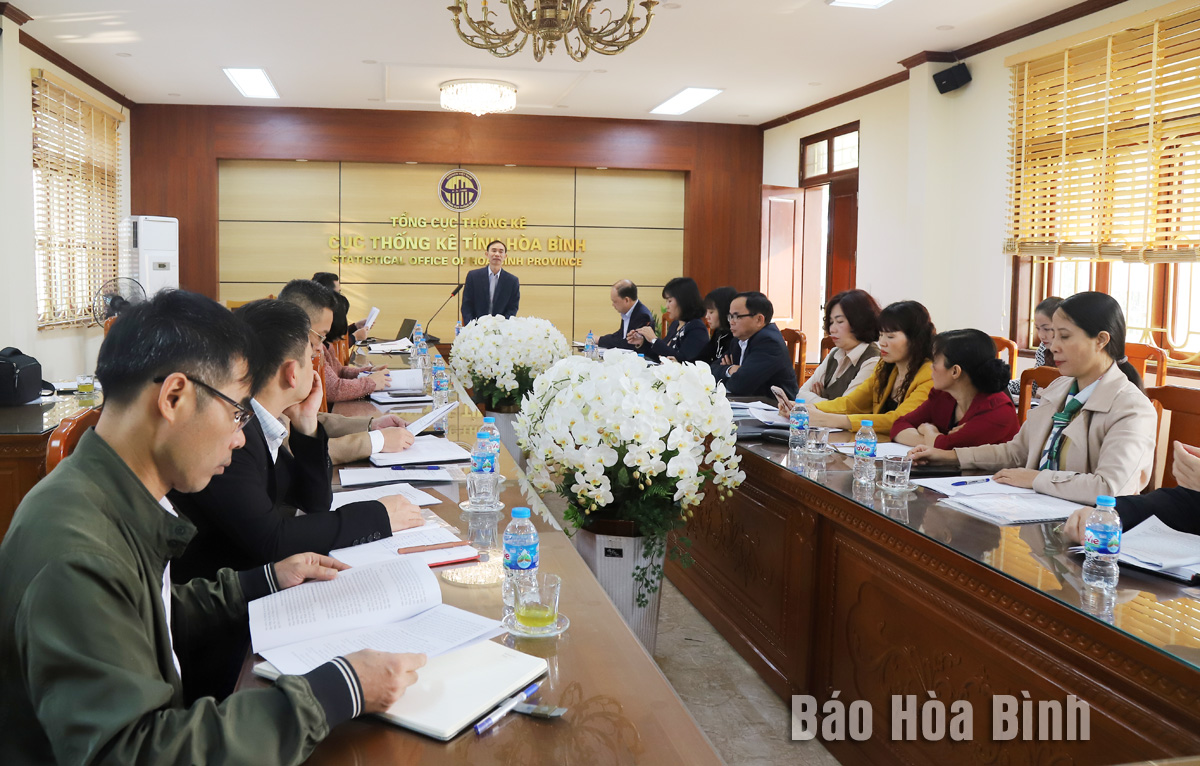
The
Provincial Statistics Department held a press conference to announce the 2024
socio-economic statistics of Hoa Binh province. Accordingly, it is estimated
that total product in the province in 2024 increased by 8.96% over the same
period last year. The proportion of agriculture, forestry and fisheries
accounts for 20.47%; industry - construction 43.91%; services 31.05%; product
tax 4.5%.

The
Provincial Statistics Department held a press conference to announce the 2024
socio-economic statistics of Hoa Binh province.
In the agricultural sector, Hoa Binh Province
has cultivated over 38.2 thousand hectares, yielding more than 210 thousand
tons of crops. Additionally, 9,160 hectares of new forests have been planted,
with an estimated timber harvest exceeding 670 thousand cubic meters. The
province’s aquaculture production has reached over 9,870 tons.
The industrial,
trade, and service sectors have experienced positive growth. Total retail sales
of goods are estimated to have increased by nearly 17.8% compared to the
previous year. The total state budget revenue is expected to reach 7.42
trillion VND, marking an increase of nearly 47% year-on-year.
In 2024, Hoa Binh Province approved investment policies and investors
for 10 projects, issued investment registration certificates for 11 projects,
and approved six commercial housing projects. The total registered investment
capital is approximately 11.8 trillion VND.
Hoa Binh province is undergoing a dynamic transformation amid Vietnam’s national digital transition. Building on Poliburo’s Resolution No. 57-NQ/TW on breakthroughs in science, technology, innovation, and national digital transformation, the province has rolled out a wide range of practical action plans. A standout initiative is the "Digital Literacy for All” movement, an effort to ensure that no one is left behind in the digital era.
Hoa Binh province is undergoing a dynamic transformation in the wake of the national digital transformation movement. Building on Resolution No. 57-NQ/TW of the Politburo on breakthroughs in science, technology, innovation, and national digital transformation, the province has implemented a wide range of practical action plans. A standout initiative is the "Digital Literacy for All” movement ambitious effort to ensure that no one is left behind in the digital age.
With a spirit of unity and proactive problem-solving, the Party Committee, the government and the people of Dong Lai Commune (Tan Lac District) have made great strides in implementing the resolutions of the 24th Party Congress of the commune for the 2020 - 2025 term. Focusing on leadership and practical actions, the commune has brought the Party’s resolutions into daily life, creating strong impacts and pushing the local development forward.
Amid the nationwide push for digital transformation, young people in Hoa Binh Province are stepping up as dynamic pioneers, applying technology to enhance Youth Union operations and expand the reach of youth-led initiatives. Through creativity and adaptability, Youth Union organizations at all levels have introduced a series of practical solutions, contributing to modern governance and community development.
In recent years, An Nghia commune, located in Lac Son district, has stepped up administrative reform, focusing on improving the quality and efficiency of its single-window service unit for receiving and processing administrative procedures. These improvements have helped create favourable conditions for local residents and organisations to handle administrative procedures, contributing to the commune’s broader socio-economic development.
The Prime Minister-approved master plan to develop the multi-use value of forests ecosystems through 2030, with a vision to 2050, aims to improve the management and sustainable use of forest resources, create jobs, increase incomes, and improve the living standards of ethnic minorities, people in mountainous and remote areas, forest workers and those living near forests.



